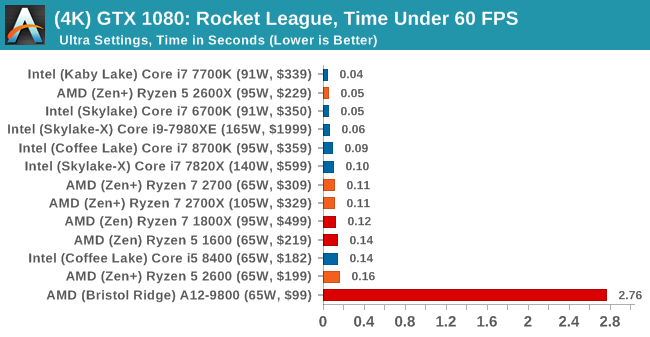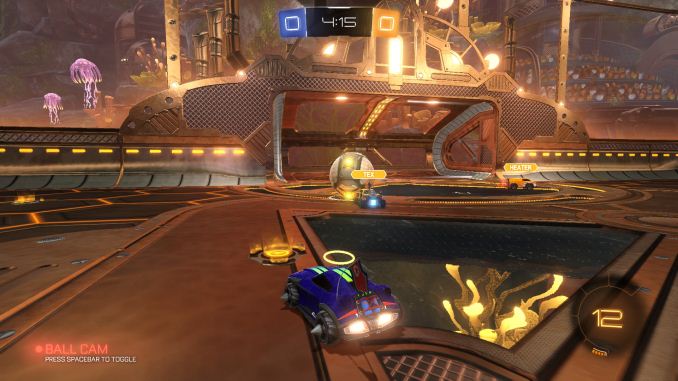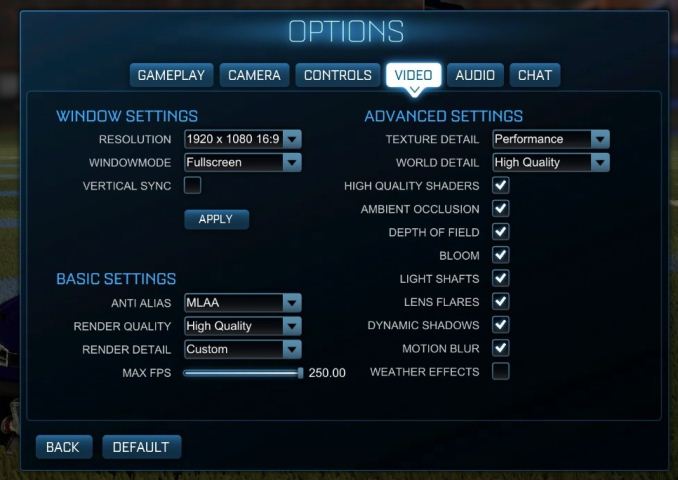The AMD 2nd Gen Ryzen Deep Dive: The 2700X, 2700, 2600X, and 2600 Tested
by Ian Cutress on April 19, 2018 9:00 AM ESTRocket League
Hilariously simple pick-up-and-play games are great fun. I'm a massive fan of the Katamari franchise for that reason — passing start on a controller and rolling around, picking up things to get bigger, is extremely simple. Until we get a PC version of Katamari that I can benchmark, we'll focus on Rocket League.
Rocket League combines the elements of pick-up-and-play, allowing users to jump into a game with other people (or bots) to play football with cars with zero rules. The title is built on Unreal Engine 3, which is somewhat old at this point, but it allows users to run the game on super-low-end systems while still taxing the big ones. Since the release in 2015, it has sold over 5 million copies and seems to be a fixture at LANs and game shows. Users who train get very serious, playing in teams and leagues with very few settings to configure, and everyone is on the same level. Rocket League is quickly becoming one of the favored titles for e-sports tournaments, especially when e-sports contests can be viewed directly from the game interface.
Based on these factors, plus the fact that it is an extremely fun title to load and play, we set out to find the best way to benchmark it. Unfortunately for the most part automatic benchmark modes for games are few and far between. Partly because of this, but also on the basis that it is built on the Unreal 3 engine, Rocket League does not have a benchmark mode. In this case, we have to develop a consistent run and record the frame rate.
Read our initial analysis on our Rocket League benchmark on low-end graphics here.
With Rocket League, there is no benchmark mode, so we have to perform a series of automated actions, similar to a racing game having a fixed number of laps. We take the following approach: Using Fraps to record the time taken to show each frame (and the overall frame rates), we use an automation tool to set up a consistent no-bot match on easy, with the system applying a series of inputs throughout the run, such as switching camera angles and driving around.
It turns out that this method is nicely indicative of a real match, driving up walls, boosting and even putting in the odd assist, save and/or goal, as weird as that sounds for an automated set of commands. To maintain consistency, the commands we apply are not random but time-fixed, and we also keep the map the same (Aquadome, known to be a tough map for GPUs due to water/transparency) and the car customization constant. We start recording just after a match starts, and record for 4 minutes of game time (think 5 laps of a DIRT: Rally benchmark), with average frame rates, 99th percentile and frame times all provided.
The graphics settings for Rocket League come in four broad, generic settings: Low, Medium, High and High FXAA. There are advanced settings in place for shadows and details; however, for these tests, we keep to the generic settings. For both 1920x1080 and 4K resolutions, we test at the High preset with an unlimited frame cap.
All of our benchmark results can also be found in our benchmark engine, Bench.
MSI GTX 1080 Gaming 8G Performance
1080p



4K
















545 Comments
View All Comments
ComposingCoder - Thursday, April 19, 2018 - link
just an FYI, they tested on different settings..... Toms Hardware for example used High on civ VI vs ultra that was used here.fallaha56 - Thursday, April 19, 2018 - link
Try techradar who actually patchedThey too are showing massive Intel hits
RafaelHerschel - Thursday, April 19, 2018 - link
Correct me if I'm wrong, but TechRadar seems to have tested only two games and provides minimal information on how they tested. Plus, Intel is still a bit faster in their tests.fallaha56 - Thursday, April 19, 2018 - link
Look at the geekbench scoresThey also include ‘before and after’ Spectre2 patches for Intel
The reliance of Intel on prefetch is well-known and now it’s busted
Crazyeyeskillah - Friday, April 20, 2018 - link
AMD hardware crushes intel on GEEKBENCH. You have to look at all tests together, and never focus on one test, unless that is the only thing you are buying your processor for, like gaming, or video encoding.sardaukar - Thursday, April 19, 2018 - link
There's no need to be a dick about it.SkyBill40 - Thursday, April 19, 2018 - link
Burden of proof fallacy?ACTIVATE!
xidex2 - Thursday, April 19, 2018 - link
So you are now Intel engineer or what? How do you know what impact those patches have on Intel CPUs? Get a grip and delete these childish comments.RafaelHerschel - Thursday, April 19, 2018 - link
I'll add Hardware Unboxed on YouTube.ACE76 - Thursday, April 19, 2018 - link
Anandtech isn't the only one to have come to this conclusion bud.